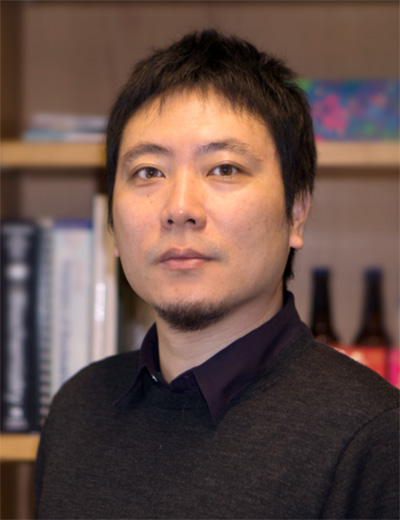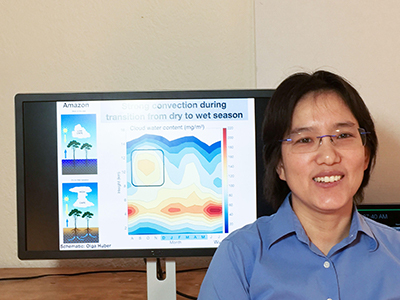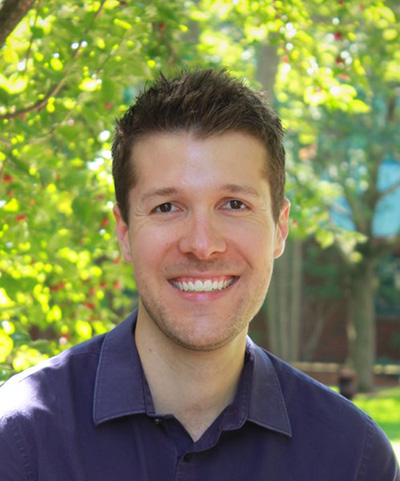PROVIDENCE, R.I. [Brown University] — The National Science Foundation has awarded five Brown University faculty members with Early Career Development (CAREER) awards, the NSF’s most prestigious awards in support of early-career faculty nationwide.
Assistant professors Ou Chen, Kevin Escudero, Jung-Eun Lee, Daniel Ritchie and Anita Shukla will each receive five years of support for their research efforts as well as teaching and outreach activities. The awards are aimed at creating a foundation for career-long contributions to research and teaching.
Here is an overview of each faculty member's research, which the CAREER grants will help to fund:
Quasicrystals are a strange class of materials with a patterned yet non-repeating microstructure. The unique structure of these materials gives them intriguing properties that make them potentially useful in everything from non-stick or heat-insulating coatings to new kinds of electronic and optical devices. In a 2018 paper published in Science, Ou Chen, an assistant professor of chemistry, reported a quasicrystalline lattice made from pyramid-shaped nanoparticles--the first quasicrystal ever made from a single nanoparticle component. With his CAREER award, Chen will further his research on the properties of nanoparticle-based quasicrystalline lattices and further explore how these materials can be assembled.

For his CAREER project, Kevin Escudero, an assistant professor of American studies, will focus on a growing segment of the U.S. workforce: immigrants pursuing graduate and professional degrees. Escudero will compile a national level dataset on the educational trajectories and career plans of this subpopulation of graduate and professional students. He will then compare the experiences of students across different generational groups and statuses to investigate the factors that affect students’ ability to succeed in their educational programs, as well as evaluate the influence of those characteristics on their future career plans.

The Amazon basin has been called the "Green Ocean,” a term inspired by the emerald expanse of its dense forest canopy. In the rainy season, the analogy has another significance as rain over the region falls primarily from mid-depth cumulus clouds, which resemble those commonly found over tropical oceans. But prior work by Jung-Eun Lee, an assistant professor of Earth, environmental and planetary sciences, shows that at the end of the dry season the analogy breaks down, and clouds look more like the cumulus towers that form over dry grasslands. For her CAREER work, Lee will use a climate model, satellite data and other observations to further study the ways in which plant physiology influences cloud formation and rain characteristics in this critical region. The research will shed new light on the interaction between Earth’s surface and its atmosphere.

High-quality 3D computer models of objects are useful in industries ranging from entertainment to manufacturing. In recent years, 3D models have become increasingly important in training artificial intelligence algorithms, for example in helping robots to learn how to identify and manipulate objects. Useful as they are, creating these models is difficult, often requiring years of specialized training. For his CAREER research, Daniel Ritchie, an assistant professor of computer science, will work to make such models easier to produce. He plans to combine user-friendly symbolic programming to generate basic shapes with neural network machine learning to sharpen the details into high-fidelity.

Anita Shukla, an assistant professor in the School of Engineering, will use her CAREER award to study the use of nanoparticles in delivering anti-fungal medications. Fungal infections lead to more than 1.6 million worldwide deaths each year, yet the existing arsenal of antifungals is highly limited compared to antibacterial agents, and many suffer from complications including host toxicity that hinder their clinical use. Shukla will investigate methods of targeting newly developed nanoparticles containing anti-fungal agents to fungal cells. The nanoparticle delivery system has the potential to be more effective than freely circulating drugs and could pose a lower risk of side effects to patients.
